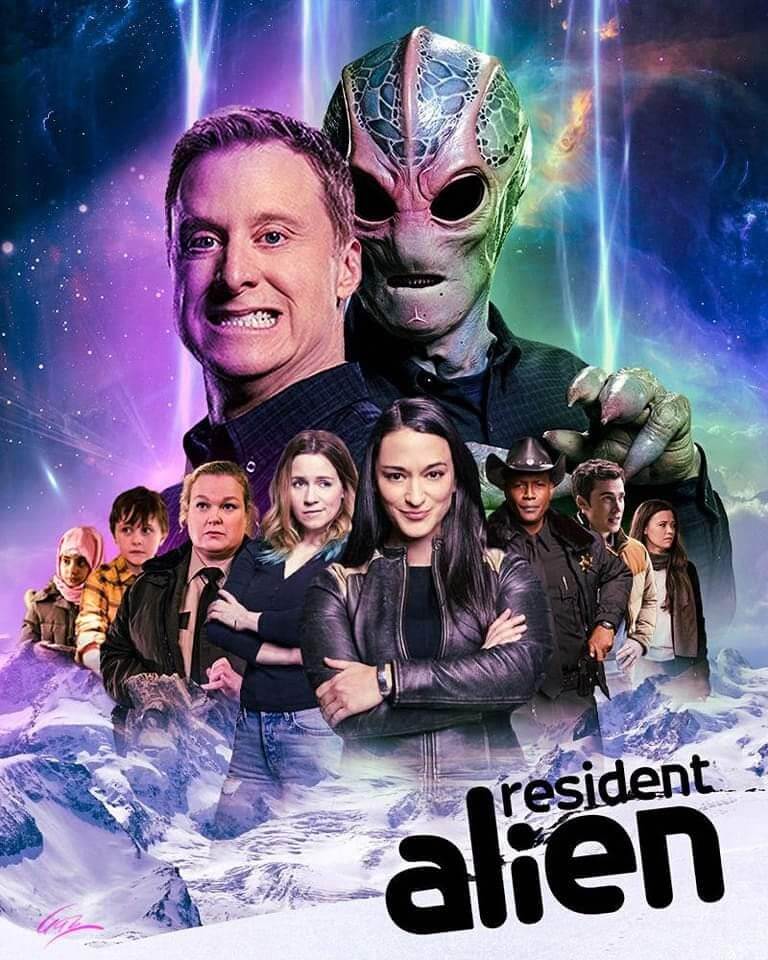
“Harry Vanderspeigle” might’ve started as an alien in disguise, but by the time Syfy’s Resident Alien wrapped up, he was one of the most human characters on television. That’s what made it hit differently.
You’re watching this extraterrestrial being who’s supposed to wipe out humanity, yet he ends up doing something most people struggle with: finding purpose, empathy, and real connection.
After four seasons of sharp humor, heartfelt storytelling, and unexpected emotional depth, Resident Alien has officially been cancelled.
The show will end with Season 4, airing Friday nights at 10/9c on Syfy and USA Network. It’s the kind of cancellation that feels premature, like walking out of a story with a few pages still left unturned.
You might’ve been like me, tuning in for the laughs but sticking around because something about Harry’s journey felt personal.
Watching him try to blend in, mess up, make friends, and figure out right from wrong reminded me of trying to fit in as the new kid in town or stumbling through a new job where everyone else seemed to speak a different language. It was relatable in the weirdest way.
Fans like you and me are left wondering: why end something that had such a strong voice and a growing audience? And more importantly, could anything have saved it?
That’s what this deep dive is all about: where it all started, what made it such a standout series, and how things ended the way they did. There’s a lot to unpack here, and whether you’re a longtime fan or someone just discovering the buzz, there’s a reason Resident Alien left a mark.
From Comics to Screen
Resident Alien began as a comic book series written by Peter Hogan and illustrated by Steve Parkhouse, published under the banner of Dark Horse Comics.
The setup was brilliantly low-key: an alien crash-lands on Earth, takes on the name Harry Vanderspeigle, and settles into life as a small-town doctor. He observes humans like a scientist would observe ants, quietly, curiously, with a touch of distance.
The tone of the comics was more meditative than manic: slower-paced, filled with inner dialogue, and styled like a detective noir layered in sci-fi. Think The X-Files meets Columbo, but with a more philosophical lens.
Chris Sheridan, best known for his work on Family Guy, saw something in those quiet panels and chose to flip the volume dial way up for TV. The comedy got sharper.
The emotions ran deeper. The story expanded into something bigger, bolder, and more chaotic in the best way. He adapted and reimagined the source material.
Sheridan took Harry’s internal musings and gave them life through awkward interactions, bizarre misinterpretations of human behavior, and scenes that made you laugh one minute and pause the next.
What I personally loved was how the TV version made space for absurd humor and emotional gut punches in the same breath. You’d watch Harry fail miserably at human small talk, then see him make a heartbreaking choice that showed he was slowly learning compassion.
Sheridan’s version wasn’t afraid to get weird, but it also wasn’t afraid to get real. The contrast between alien hijinks and the quiet beauty of human relationships gave the series its emotional weight.
Taking a cult comic and turning it into something this memorable takes guts and a deep understanding of what makes a story tick. Sheridan nailed it. He built a world where alien conspiracies and diner gossip could share the same screen, and somehow, it all worked.
Who Created the Resident Alien TV Series?
Chris Sheridan completely reimagined how the story could connect with modern audiences. As the showrunner and executive producer, he poured his own style into every episode.
You could feel it in the awkward silences, the weird alien one-liners, and the surprisingly touching moments between characters who didn’t belong but tried anyway. Sheridan had a knack for making the ridiculous feel sincere, and that’s a big part of what made Resident Alien feel different from anything else on TV.
He made it clear in several interviews that the heart of the show was never about space battles or high-tech gadgets. He was far more interested in using the alien character as a lens to explore everyday human struggles: grief, loneliness, friendship, and finding purpose.
Watching Harry fail spectacularly at being “normal” often hit closer to home than most drama shows that tried too hard to be relatable. Sheridan knew how to play with discomfort and turn it into emotional gold.
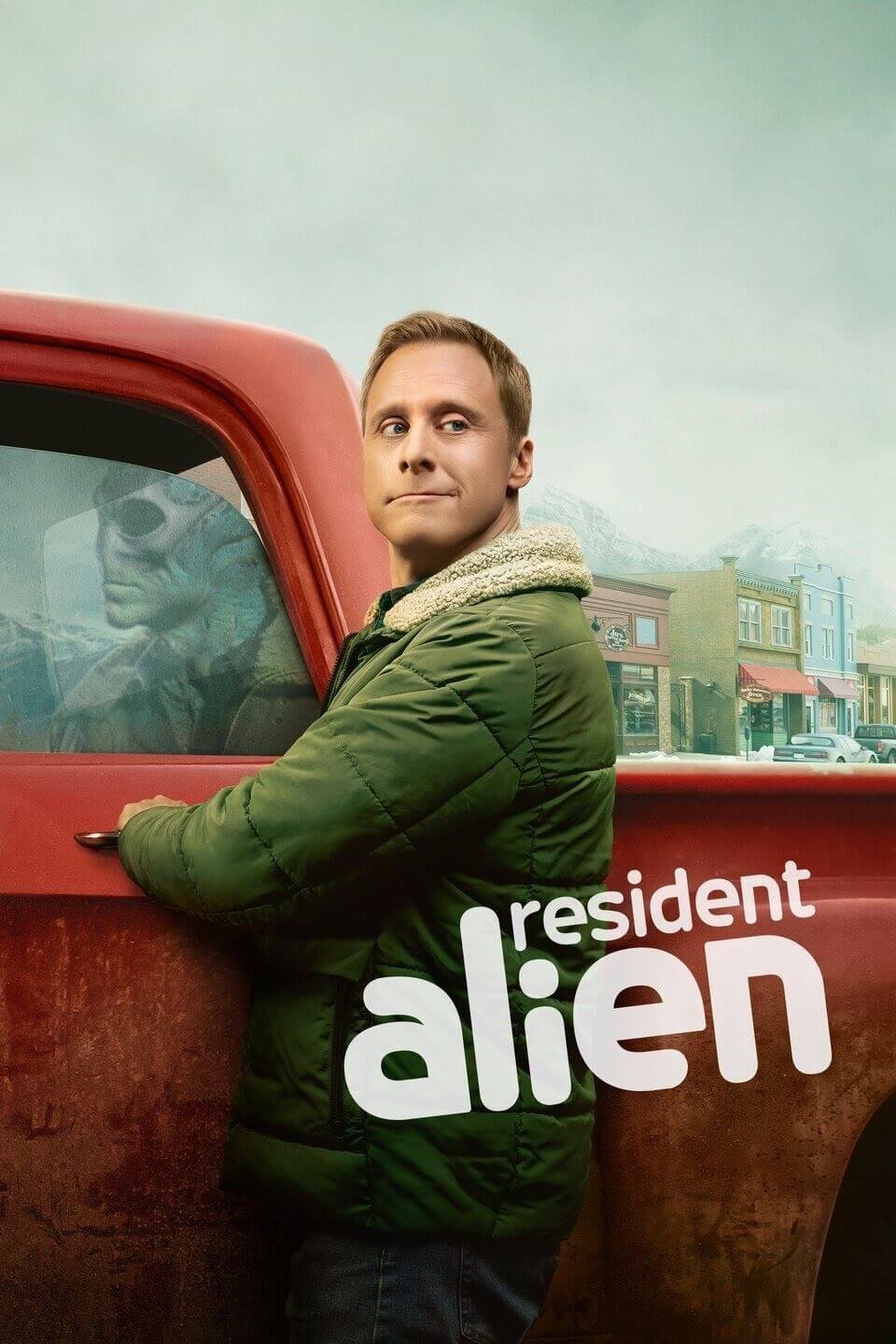
Before Resident Alien, Sheridan built his career as a comedy writer on shows like Family Guy, where he learned how to balance absurd humor with just enough storytelling structure to make the laughs land. That background shaped the DNA of Resident Alien.
Scenes that could’ve been pure slapstick ended up layered with meaning. A great example is when Harry tries to understand emotions by watching soap operas, something that sounds like a throwaway gag but ends up revealing how badly he wants to feel something real.
You can tell this project meant a lot to him. Sheridan approached it like someone who wasn’t afraid to take risks. He took a quiet, niche comic and turned it into a full-blown sci-fi dramedy with an emotional core.
That’s not easy, especially in a genre that often leans on explosions and aliens speaking in monotone. Sheridan gave us something weird, funny, and surprisingly moving, and he did it with a clear creative vision from start to finish.
What Is Resident Alien About?
Resident Alien is a story about identity, morality, and empathy, but told through the eyes of someone completely outside the human experience. You follow Harry, a shape-shifting alien who crash-lands near the remote town of Patience, Colorado.
His mission is clear from the beginning: eliminate all life on Earth. But plans shift quickly after he kills a local doctor and takes over his identity. Pretending to be Dr. Harry Vanderspeigle, he finds himself thrown into a murder investigation and awkwardly navigating small-town life.
What starts as a cover operation slowly becomes a personal evolution. Harry begins to observe people closely—their rituals, their flaws, their kindness—and something changes in him. You see it in the way he starts helping others, even when it conflicts with his original mission.
He gets drawn into friendships, particularly with young Max, a boy who can actually see through his disguise, and Asta, the nurse who works beside him and unknowingly becomes his moral anchor.
Then there’s the sci-fi tension running alongside all the heart. Harry finds himself battling other alien races like the Greys, who abduct him and steal his essence, and the Mantids, who infiltrate human society using his stolen identity.
More than background threats, they raise the stakes and force Harry to make impossible choices. He starts fighting not to conquer Earth, but to protect it from others who still see humanity as disposable.
What I loved most was how Resident Alien never leaned too far into one genre. One moment, you’re watching a deeply philosophical monologue about the value of life. The next, Harry’s fumbling through human expressions or ruining a town event with his complete lack of social awareness.
The show mixes tones in a way that feels refreshing. A murder mystery might lead to a pie-eating contest. An alien showdown might end with a heartfelt hug. You’re never quite sure where it’s going, but that’s exactly what makes it worth watching.
Why Was Resident Alien Cancelled?
A mix of behind-the-scenes shifts, viewer metrics, and production costs likely led to Resident Alien’s cancellation. It was a pileup of small fires that added up to a tough decision for the networks involved.
The first and most obvious factor was network realignment. Syfy and USA Network, both under the NBCUniversal umbrella, have been moving away from scripted series in recent years.
According to a report from Variety, NBCU has restructured its strategy to invest more in unscripted reality content and streaming exclusives. That shift means shows like Resident Alien, no matter how beloved, are harder to keep afloat unless they’re pulling massive numbers or already tied to a larger franchise.
Viewership also played a role. While Resident Alien had a strong start, its ratings began to slip after Season 2. The move to USA Network in Season 3 confused some fans, making it harder to track when and where to watch new episodes.
According to tracking sites like TV Series Finale and TV Grim Reaper, the show saw a noticeable drop in the key 18–49 demographic, which advertisers value most. That demographic drop can be the kiss of death for shows with mid-range budgets.
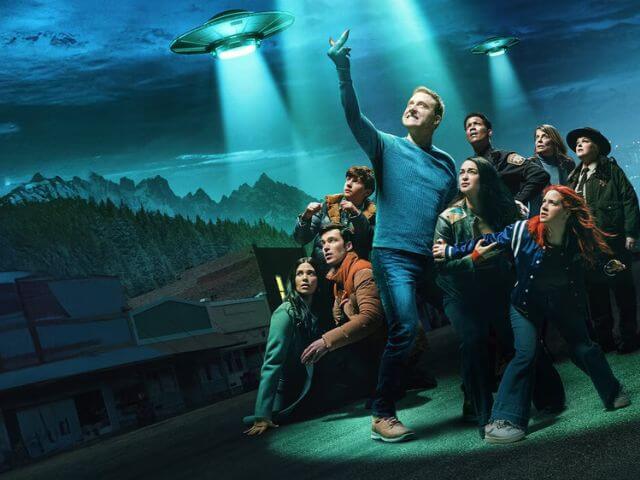
Then there’s the cost factor. Sci-fi shows are expensive by nature. You’ve got CGI, creature design, elaborate sets, and in this case, a growing ensemble of talented actors like Alan Tudyk, Sara Tomko, and Corey Reynolds, none of whom come cheap by Season 4.
Without high enough returns from ad revenue, licensing deals, or international syndication, keeping a series like this alive becomes a financial risk for the network.
Still, the decision didn’t reflect the level of love from fans. The loyalty remained, and social media proved that. People kept watching, posting, drawing fan art, writing theories, and begging for renewal.
It’s frustrating to see support like that get overruled by boardroom metrics. You know a show has heart when people care enough to fight for it, even after the cancellation notice drops.
What Could Have Been Done to Save Resident Alien?
In my view, Resident Alien was built for streaming. A platform like Peacock, which already hosts NBCUniversal content, could have been the perfect home. Netflix would’ve worked, too.
Shows with quirky charm and a strong character arc often do well there—The Umbrella Academy, Russian Doll, Atypical. Streaming platforms are more forgiving with niche audiences and less reliant on weekly ratings.
That shift alone could’ve given Resident Alien the space to grow and reach viewers who missed it on cable.
The show needed a louder spotlight. There wasn’t enough marketing push during the later seasons, especially after the move to USA Network. I remember scrolling through Twitter and realizing most people didn’t even know new episodes were airing.
A better promotional rollout—more targeted ads, cast appearances, convention panels, teaser trailers—could have turned things around. The content was solid. The awareness just didn’t catch up.
Crowdsourcing momentum can work wonders when networks hesitate. Lucifer and The Expanse didn’t survive because their numbers were massive. They survived because their fans wouldn’t shut up. People launched petitions, flooded social media, made fan videos, and rallied celebrities to speak up.
Resident Alien had the same level of devotion, but it needed a more organized push. A well-timed hashtag movement or fan-led letter-writing campaign might’ve gotten the attention of a streamer willing to take a chance.
There’s also the option of a limited-series wrap-up or a movie adaptation. Even something like a comic book continuation through Dark Horse could’ve offered closure for those who felt invested in Harry’s story.
You don’t always need twenty more episodes to finish something right. You just need a platform that believes the audience is worth serving. And in this case, they were. They still are.
What Makes Resident Alien Unique?
Resident Alien stands out in a sea of sci-fi shows because it knows how to balance the ridiculous with the meaningful. The humor hits hard, but so do the emotions.
One moment, you’re watching an alien awkwardly mimic human laughter like a malfunctioning chatbot; the next, you’re watching him quietly mourn the idea of losing his newfound friends.
That contrast makes every episode feel personal, even when the plot spirals into full-on alien warfare or government conspiracy.
Alan Tudyk’s performance as Harry is one of the biggest reasons the show works as well as it does. He switches from deadpan delivery to emotional vulnerability in a blink, pulling you into Harry’s world whether he’s dissecting a corpse or dancing to ’90s pop music.
There’s a specific charm Tudyk brings to roles like this, part sci-fi veteran, part physical comedy expert, part tragic antihero. Watching him try to “act human” never feels repetitive, because it’s always coming from a place of discovery.
Every handshake, every social faux pas, every moment of confusion somehow tells you more about your own quirks than you’d expect from a show about an alien in a stolen body.
The writing doesn’t shy away from heavier themes either. Resident Alien explored the challenges Indigenous communities face through characters like Asta and her family. It framed Harry’s status as an outsider as a metaphor for real-world displacement and immigration.
Those stories were woven thoughtfully. Never shoved in for effect. You could tell the writers cared about giving these characters space to grow without making it feel forced or preachy.
The supporting cast brought that world to life. Sara Tomko as Asta felt like the emotional anchor from the very first episode. Corey Reynolds gave Sheriff Mike a mix of bravado and vulnerability that made him more than comic relief.

Alice Wetterlund’s D’Arcy was chaotic and charming in all the best ways. And Judah Prehn, as Max, managed to do what most child actors can’t—hold his own next to an alien lead with perfect comedic timing.
Then there were the guest stars: Linda Hamilton brought that no-nonsense edge that only she can deliver. Terry O’Quinn stepped in with the kind of gravitas that made every scene he was in feel like it mattered. These appearances didn’t feel like cameos. They felt like the show leveling up without losing its weird, small-town soul.
Resident Alien never tried to fit the usual sci-fi mold. It carved out its own lane: part drama, part comedy, part sci-fi, all heart. That’s rare, and that’s why so many of us are still talking about it.
Is Resident Alien a good show?
Absolutely. Critics agree, and the numbers back it up. Resident Alien holds a 97% audience score on Rotten Tomatoes, which is rare for any show, let alone one that blends genres this boldly. On IMDb, it sits at a solid 7.9/10, a score earned through consistency, strong performances, and fan loyalty across four seasons.
Reviewers didn’t hold back on their praise. Entertainment Weekly called it “a rare TV unicorn: funny, thoughtful, and emotionally grounded.”
That line stuck with me because it sums up exactly why the show works. It’s weird in the best way, quirky without being gimmicky, emotional without getting sappy, and smart without being smug.
The AV Club nailed it too when they said the series combines “heartfelt character arcs with conspiracy-fueled sci-fi chaos.” One episode might dive into alien biology, and the next might explore grief, addiction, or complicated friendships. It’s a messy blend, but it works.
I usually skip sci-fi shows unless someone twists my arm. Spaceships, glowing orbs, people talking in monotone. None of that pulls me in. Resident Alien was different. It pulled me in with the humor—Harry trying to figure out how to blink like a human, or screaming in joy over his first slice of pizza.
But it kept me around with its heart. Watching Harry change, episode by episode, made me feel like I was watching someone grow up in real time, even if he was a space assassin in disguise.
Resident Alien isn’t for everyone. The humor leans awkward, the pacing slows down at times, and some moments feel downright strange. But when it clicks with you, it really clicks.
It’s the kind of show you think about days after you finish it, wondering how someone made something so absurd feel so real. Give it a chance, and you might end up caring more about an alien in a stolen body than you ever expected.
What qualifies as a Resident Alien?
The term resident alien has a clear meaning in immigration law. It refers to a non-citizen who is legally allowed to live in a country where they aren’t a citizen, usually through permanent residency, like a green card, or a long-term visa.
It’s the kind of term you’d hear during tax season or at immigration offices, not usually in a sci-fi context.
Resident Alien flips that term on its head in the most literal, hilarious, and thought-provoking way. Harry is from a completely different planet.
And yet, he walks around town as a legal resident, using the identity of a local doctor. He signs documents, treats patients, pays rent, and attends town events, all while hiding his true form. The show leans into that irony, but it also digs into something deeper.
There’s a quiet commentary woven into the show about how society treats people who don’t quite fit in. Harry is always trying to blend in, to understand the language, the customs, the relationships.
And at every turn, he’s reminded, sometimes harshly, that being different is noticed, judged, or misunderstood. That mirrors the experience of many immigrants and outsiders trying to navigate new spaces. You don’t have to be from another galaxy to know what it feels like to be the one who stands out.
Watching Harry fumble through human behavior makes you laugh, but it also makes you think about how you treat people who don’t speak like you, look like you, or act the way you expect.
The wordplay in the title is clever, but the meaning underneath it carries weight. It reminds you that belonging isn’t about where you come from. It’s about what you choose to do once you’re here.
Fan Reactions and Community Buzz
Fans didn’t take the news quietly, and honestly, I didn’t either. The moment the cancellation was announced, social media lit up. Hashtags like #SaveResidentAlien and #RenewResidentAlien started trending within hours.
People weren’t just sad; they were fired up. You could feel the frustration and love pouring out in every tweet, every comment, every shared gif of Harry awkwardly waving or squinting at a human emotion he didn’t quite understand.
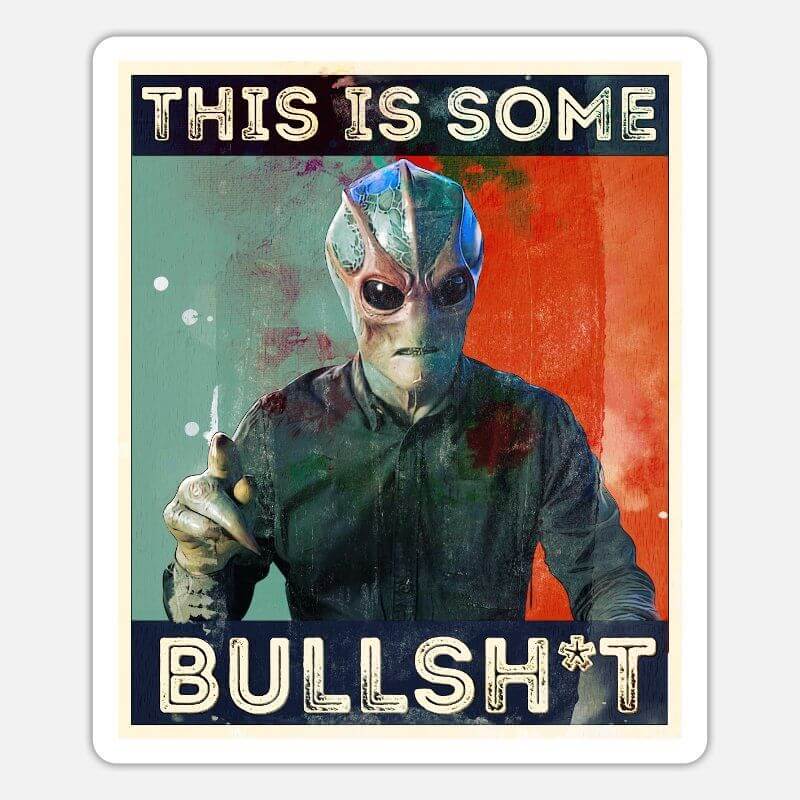
Reddit became a hub of organized chaos. Fans were posting appreciation threads, behind-the-scenes clips, and frame-by-frame breakdowns of Season 4’s most emotional moments. Some created artwork or animated tributes.
Others started tracking which streaming platforms might be most likely to pick it up. And a few fans took it even further: writing letters to NBCUniversal and tagging Hulu, Peacock, Amazon Prime, and Netflix in the hopes someone would notice the noise.
This wasn’t just about losing another show. This was about losing something that made people feel seen. Resident Alien had a way of slipping into your life and sticking around.
Maybe you saw yourself in Asta, trying to stay grounded in a world that kept shifting. Or in Sheriff Mike, hiding grief behind sarcasm. Or maybe you just liked watching Harry discover that being human means caring, messily, imperfectly, but wholeheartedly.
The show reminded people that connection is possible, even across galaxies. That kind of message doesn’t fade quietly. The fandom is still loud, still hopeful, and still holding onto the idea that someone out there might give Resident Alien the second chance it deserves. And honestly? I’m holding onto that hope, too.
What’s Next for the Cast and Creator?
Alan Tudyk isn’t slowing down anytime soon. He’s been voicing Joker and Clayface in Harley Quinn, and it’s clear that animation studios love working with him. His voice work is instantly recognizable: witty, expressive, and full of character, even when he’s playing a talking animal or a chaotic villain.
Fans of Rogue One still remember him as K-2SO, and there’s talk of his return in the Andor series. On top of that, he’s attached to a few upcoming film projects that haven’t been officially announced yet, but knowing Tudyk, there’s bound to be something unpredictable and fun in the works.
As for Chris Sheridan, nothing’s been confirmed yet, but his track record suggests he won’t be quiet for long. After spending over a decade shaping Family Guy and then building Resident Alien from the ground up, Sheridan has shown he knows how to mix absurdity with real emotion.
I wouldn’t be surprised if his next project leans into that same space, something heartfelt, a little weird, and completely original. That’s his sweet spot, and after the love Resident Alien received, it’s clear there’s an audience ready for whatever comes next.
In the meantime, you can revisit every season of Resident Alien on Peacock. Watching it from the beginning gives you a whole new appreciation for how the characters evolve. The DVD and digital versions include cast commentary and bonus scenes that offer insight into how the show came together.
Hearing Alan Tudyk talk about Harry’s weirdest moments or Sheridan explain how a joke was built over multiple episodes adds a layer of depth that fans will enjoy. It’s more than just a rewatch. It’s a chance to dive deeper into a story that managed to be both hilarious and unexpectedly moving.
A Farewell to Patience, Colorado
Some shows drag on too long. They fizzle out, repeat themselves, or lose the spark that made you care in the first place. Resident Alien didn’t get the chance to overstay.
It bowed out while it still had momentum, and that’s what makes this goodbye so hard. The story still had room to grow, the characters still had layers to uncover, and the fans were still showing up week after week. You could feel the energy was still there.
The cancellation feels like the kind of mistake that studios only realize in hindsight. Resident Alien had something rare: a clear voice and a creative team that knew exactly what kind of story they were telling.
It had a main character you rooted for even when he messed up, and a supporting cast that could carry entire episodes on their own. This wasn’t a show scrambling to find its identity. It already knew what it was.
With stronger marketing and a platform that understood how to build around character-driven sci-fi, Resident Alien could’ve become a flagship series, the kind that earns spinoffs, collectibles, and Halloween costumes for years.
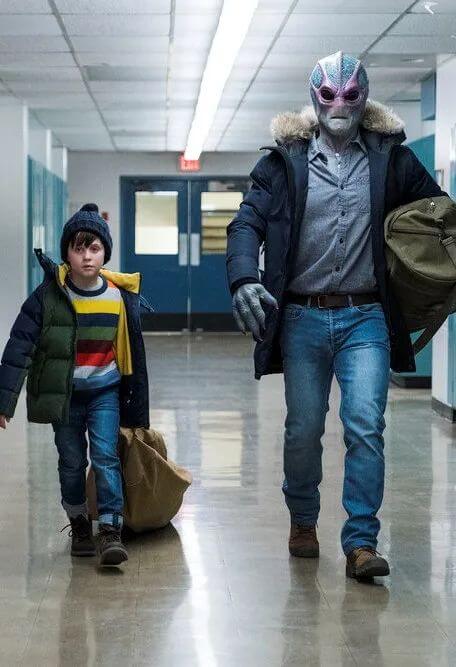
Even though the final season has aired, the story doesn’t have to disappear. You can still stream every episode on Peacock.
You can own it digitally, binge it again with friends, or introduce someone new to the town of Patience, Colorado. Sometimes, a show keeps breathing because fans keep it alive. Talk about it. Share your favorite clips. Post the lines that made you laugh, cry, or rewind.
I like to think Harry’s story isn’t completely over. Maybe someday, a network executive, a streaming algorithm, or a surprise fan campaign will crack open a door again.
Stranger things have happened, especially in a world where aliens wear human skin and learn how to love. Until then, I’ll be rewatching and quietly hoping we haven’t seen the last of Harry Vanderspeigle.




